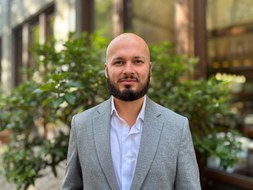Nov 03, 2025
Profile of new appointees: Prof. Dr. Stefan Razinskas

Prof. Dr. Stefan Razinskas
Prof. Dr. Stefan Razinskas has held the Chair of Organization and Management at the Faculty of Business Administration and Economics since the winter semester 2024/25. To satisfy curiosity about his new colleague, he answers a few brief questions. Below, Prof. Razinskas provides insights into his work in research and teaching.
What are your core research areas?
On the one hand, my core research areas are teamwork, especially in diverse teams. On the other hand, I research the cooperation between managers and those they lead. In doing so, I move away from the classic assumption that leadership is a unidirectional process, i.e. that it only takes place in the direction of those being led. Instead, I look at what role the leaders play in this process and to what extent the manager adapts to them.
What is your vision for the Chair?
As you have already noticed, I am still very new at TU Dresden and had no direct contact with the university before. As a result, I have relatively little organizational knowledge about what has happened at the Chair before. However, I have noticed that very good teaching has already been offered here. I would like to continue this tradition responsibly so that students will continue to enjoy taking courses in organization and management studies in the future.
At the same time, I would like to focus on my favorite projects on teamwork and leadership and teach precisely these topics. Sooner or later, all students will come into contact with the topic of leadership, hopefully one day as a manager themselves. The importance of teamwork is also important to me: how each individual functions as a team player in the team and contributes to the joint success. I not only want to convey these values to students, but also actively exemplify them in the Chair's team.
Where did you last teach/research/live?
My academic career began at Ludwig-Maximilians-Universität in Munich, where I worked in various roles for over eight years, first as a Research Associate and later as a postdoctoral researcher. At the beginning of 2020, I moved to Freie Universität Berlin as a Junior Professor of Management, where I really enjoyed it despite the pandemic. There I had the opportunity not only to design my own teaching program, but also to pursue my personal interests in research very freely. During my time at the FU Berlin, I was also lucky enough to spend a research semester at the University of California, Los Angeles (USA) to advance my projects and gain new impetus.
What was your dissertation topic?
My dissertation is entitled "Stressors in Teams: A Multilevel Approach". As the title suggests, it deals with stressors in teams and their impact on the creative performance of team members in the innovation process. I took a close look at both the stress factor of time and the composition of teams.
What was your best experience during your studies?
I particularly remember the wide range of opportunities at the TU Munich. You quickly came into contact with industrial partners and managers from the top companies in the Munich area. This exchange was challenging, but at the same time extremely enriching. It is precisely this interdisciplinary experience that I would like to make possible for my students.
What was your worst experience during your studies?
It wasn't so much a single experience that I remember. However, the first few semesters were very challenging, especially because of the many foundation modules that had to be completed in the intermediate diploma. I had to show a lot of stamina during this time. Fortunately, we motivated each other among our fellow students to successfully master the path to the main degree.
When did you know: "I want to become a professor!"?
Originally, the doctorate was primarily a career step for me, as I observed that many managers in many industrial companies have a doctorate. It wasn't until the end of my doctorate, when the pressure eased, that I realized how much I enjoyed and was fulfilled by academic work. And then one thing led to another: from postdoc in Munich to Junior Professorship in Berlin to Chair in Dresden. So your career path was by no means as straightforward or well-planned from the outset as your CV might suggest.
In any case, what is always on your desk?
Nothing at all, actually. I'm very much a "clean desk" person. I have everything important organized digitally. Exceptions are exams, which I then correct at my desk.
What positively surprised you about the TU Dresden campus?
I was surprised by the size of the campus. I still like the spaciousness and the many green areas. Although this means longer distances to the lecture halls, they feel like short walks in the countryside and therefore offer a welcome balance to everyday working life.
How well do you know Dresden?
Not yet as well as I would like. The past year has been dominated by work and my arrival at the TU. I'm looking forward to getting to know Dresden even better in the future.
What are your favorites?
I like walking through the old town. I also really like the element of water, which is why I'm regularly drawn to the Elbe. A short walk through the old town is a welcome balance to my everyday work.
Many thanks to Prof. Razinskas for the insights. We can look forward to his inaugural lecture, which will take place on June 17, 2026.
Contact:
 © Stefan Razinskas
© Stefan Razinskas
Professor
NameMr Prof. Dr. Stefan Razinskas
Send encrypted email via the SecureMail portal (for TUD external users only).
Visiting address:
Georg-Schumann-Bau, B Wing, Room 236 Münchner Platz 3
01069 Dresden
Office hours:
only by appointment
Chair holder Prof. Dr. Stefan Razinskas
https://tu-dresden.de/bu/wirtschaft/bwl/org/die-professur/inhaber
